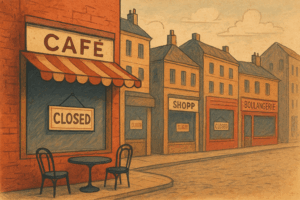Hello and welcome to this sub-part of the training “Health Control Plan”, taken from introductory guide to foodtech and the basics of modern catering ?
Today, still within the framework of the Health Control Plan (PMS), we will focus on how you, as a restaurateur, must manage food waste, waste related to packaging, as well as indoor trash cans and of roads.
You can use the document you will find below to integrate it into your PMS, adapting it if necessary to your organization! If this guide helped you, consider leaving me a little thank you comment, and sharing it on social networks 😉
Definition of waste and trash in catering
Waste brings together packaging and packaging, unserved food, and the waste from kitchen preparations.
The trash cans are made up of service trash cans, and road trash bins.
Packaging and packaging
Restaurants regularly receive food stored in packaging, as well as packaging intended to be used for delivery or takeaway.
Here are the golden rules that must be respected in order not to compromise hygiene within our premises. (remember to list these rules in the PMS, as well as communicate them to your teams!) :
- Do not introduce packaging in manufacturing premises (kitchens).
- Transfer the products unpackaged in suitable and clean containers.
- Eliminate as quickly as possible all cardboard and wooden packaging as well as polystyrene boxes.
- When unpacking, do not place packaging on work surfaces. If an exceptional situation requires it, clean and disinfect the area immediately afterwards.
- Store packaging presenting a defect or error and which must possibly be taken back by the supplier in a special area, away from the kitchen, and outside the dining areas.
- Finally, wash your hands properly after handling the packaging.

Processing food waste
In the cooking stages, or assembly stages during service, we are bound to generate food waste.
Here are two important rules to respect in such a context:
- Eliminate various waste as quickly as possible after preparation, in the kitchen trash can, which must be emptied regularly without waiting for it to be overloaded.
- Wash your hands thoroughly after the operations
In short, you should not leave trash lying around on the work surfaces. You should always apply a little product intended for this area after using an ingredient that has been deposited on the counter.
Garbage management
Kitchen trash cans
First of all, you must put in place a number of bins adapted to your activity.
These bins must be placed near strategic areas: snacking, production, order preparation, etc.
Here are the golden rules to respect in terms of hygiene, with regard to these service bins, and which must be communicated to the teams and integrated into this chapter of the PMS:
- Trash cans must all contain a bag, whose volume corresponds to the trash can.
- They must not open by manual control, in order to avoid contaminating contacts.
- These bins are not intended to be overloaded, but to be absolutely emptied at the end of the day (except at the end of service when it has been loaded).
- You can also have mini “buffer” bins allowing you to dispose of waste ultra-quickly during a rush. These “buffer” bins must be emptied as soon as calm returns to work.
- The service bins must above all not be placed next to a heat zone (radiator, machine) or draft.
- They must be, in accordance with the Cleaning and Disinfection Plan, cleaned at the end of each service.
Road trash bins
Every day, you have to empty the service trash cans in the road trash bin(s) that will be taken out.
Here are the golden rules relating to these road trash bins:
- Road trash bins must be stored in a dedicated area.
- These trash cans must hold a bag, whose volume corresponds to their size, which will be replaced regularly.
- It's necessary regularly clean and disinfect these road trash bins and the area dedicated to them.
- As with every task, you must clean your hands effectively after handling these trash cans.
And that's it, that's it for the treatment of waste and trash. I hope that you have fully understood these concepts, which are certainly quite basic, but which we can never repeat enough!
See you soon for new learning!





